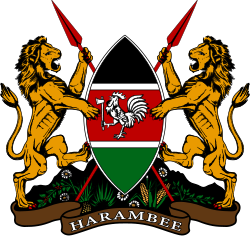| Prime Minister of Kenya | |
|---|---|
 | |
| Seat | Nairobi |
| Formation | 1 June 1963 17 April 2008 |
| First holder | Jomo Kenyatta |
| Final holder | Raila Odinga |
| Abolished | 12 December 1964 9 April 2013 |
 |
|---|
The prime minister of Kenya was a post in the Kenyan government. The first prime minister of Kenya was Jomo Kenyatta, who became prime minister in 1963. In 1964, when Kenya became a republic, the post of prime minister was abolished and Jomo Kenyatta became president. Following a power-sharing agreement in February 2008, the role was recreated in April 2008 and held by Raila Odinga. The position was again abolished by the 2010 Constitution after the 2013 elections.
Contents
The proposed 2021 constitutional referendum would have decided whether to constitutionally reestablish the office. The process of the proposed amendments to the constitution, was declared unconstitutional by the Supreme Court of Kenya On 31 March 2022. The court also barred the Independent Electoral and Boundaries Commission from proceeding with the referendum. [1]
A similar office, that of Prime Cabinet Secretary, was established by Executive Order No. 1 of 2022 on 27 September 2022.

